The OWC Aura Pro X2 SSD Review: An NVMe Upgrade For Older Macs
by Billy Tallis on June 5, 2019 10:15 AM ESTSequential Read Performance
Our first test of sequential read performance uses short bursts of 128MB, issued as 128kB operations with no queuing. The test averages performance across eight bursts for a total of 1GB of data transferred from a 16GB test file. Between each burst the drive is given enough idle time to keep the overall duty cycle at 20%.
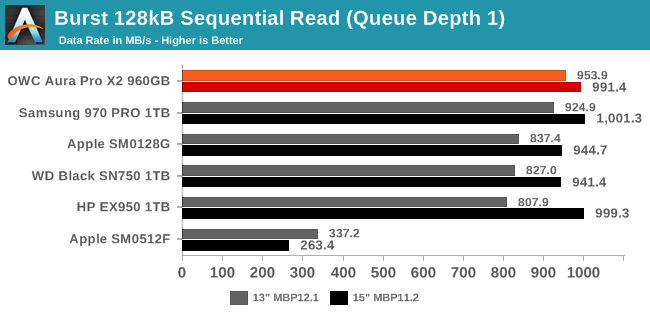
The OWC Aura Pro X2 and other modern drives all provide a bit less than 1GB/s on the burst sequential read test, as does the more recent of the two Apple OEM SSDs, while the older Apple drive delivers worse performance than we now expect from a low-end SATA SSD.
Our test of sustained sequential reads uses queue depths from 1 to 32, with the performance scores computed as the average of QD1, QD2 and QD4. Each queue depth is tested for up to one minute or 32GB transferred, from a 64GB test file.
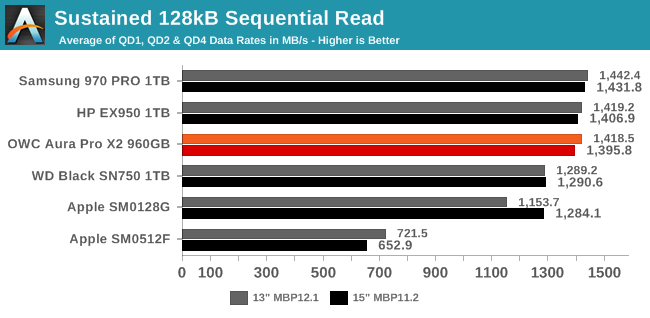
On the longer sequential read test with some higher queue depths, the Aura Pro X2 is again more or less tied for first place, and the WD Black SN750 is slightly slower than the other modern drives. The older Apple SSD is still markedly slow, but the gap is down to roughly a factor of two rather than three. Differences between the two laptops are for the most part much smaller than they were for the burst sequential read test.
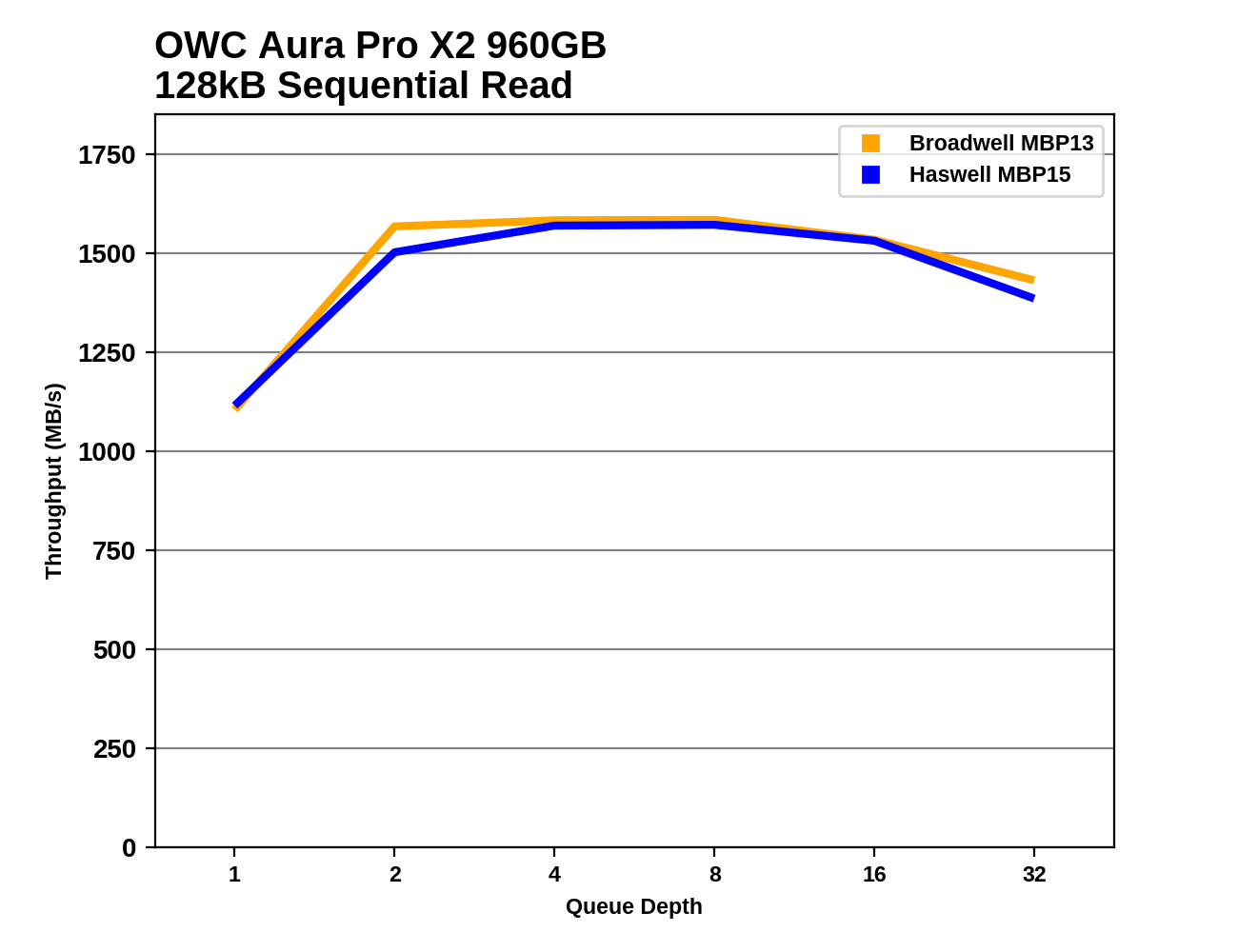 |
|||||||||
Most of these SSDs offer full sequential read performance at QD2, but the more recent Apple SSD needs higher queue depths, especially on the 13" laptop. Several of the drives (including the OWC) show a bit of a decline in performance at the highest queue depths where the OS has many active threads processing IO requests.
Sequential Write Performance
Our test of sequential write burst performance is structured identically to the sequential read burst performance test save for the direction of the data transfer. Each burst writes 128MB as 128kB operations issued at QD1, for a total of 1GB of data written to a 16GB test file.
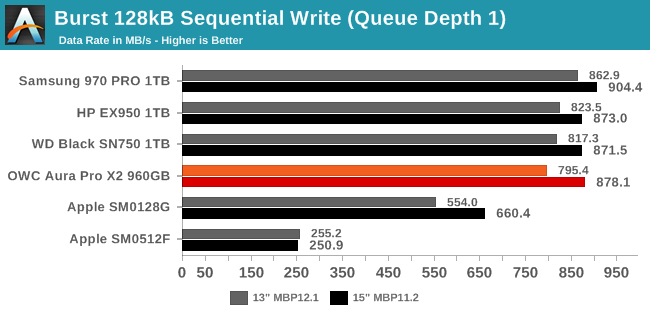
The modern NVMe drives all perform similarly on the burst sequential write test. The OWC Aura Pro X2 seems to be the slowest of the four, though not by a big enough margin to worry about. The older of the two Apple SSDs provides sub-SATA performance, while the more recent but smaller drive is a bit faster than SATA drives are capable of.
Our test of sustained sequential writes is structured identically to our sustained sequential read test, save for the direction of the data transfers. Queue depths range from 1 to 32 and each queue depth is tested for up to one minute or 32GB, followed by up to one minute of idle time for the drive to cool off and perform garbage collection. The test is confined to a 64GB test file.
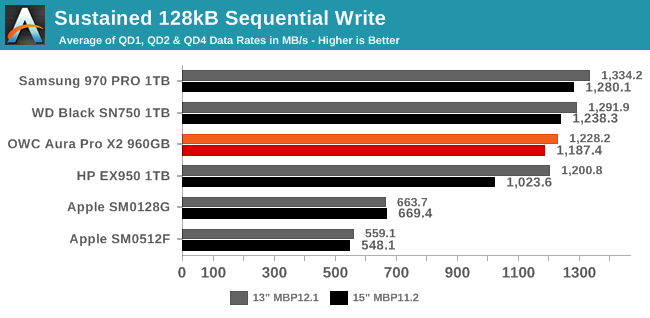
On the longer sequential write test with some higher queue depths, the Aura Pro X2 ends up slightly faster than the other SM2262EN-based drive (the HP EX950), but the differences between the modern NVMe drives are still small compared to their lead over the Apple original drives.
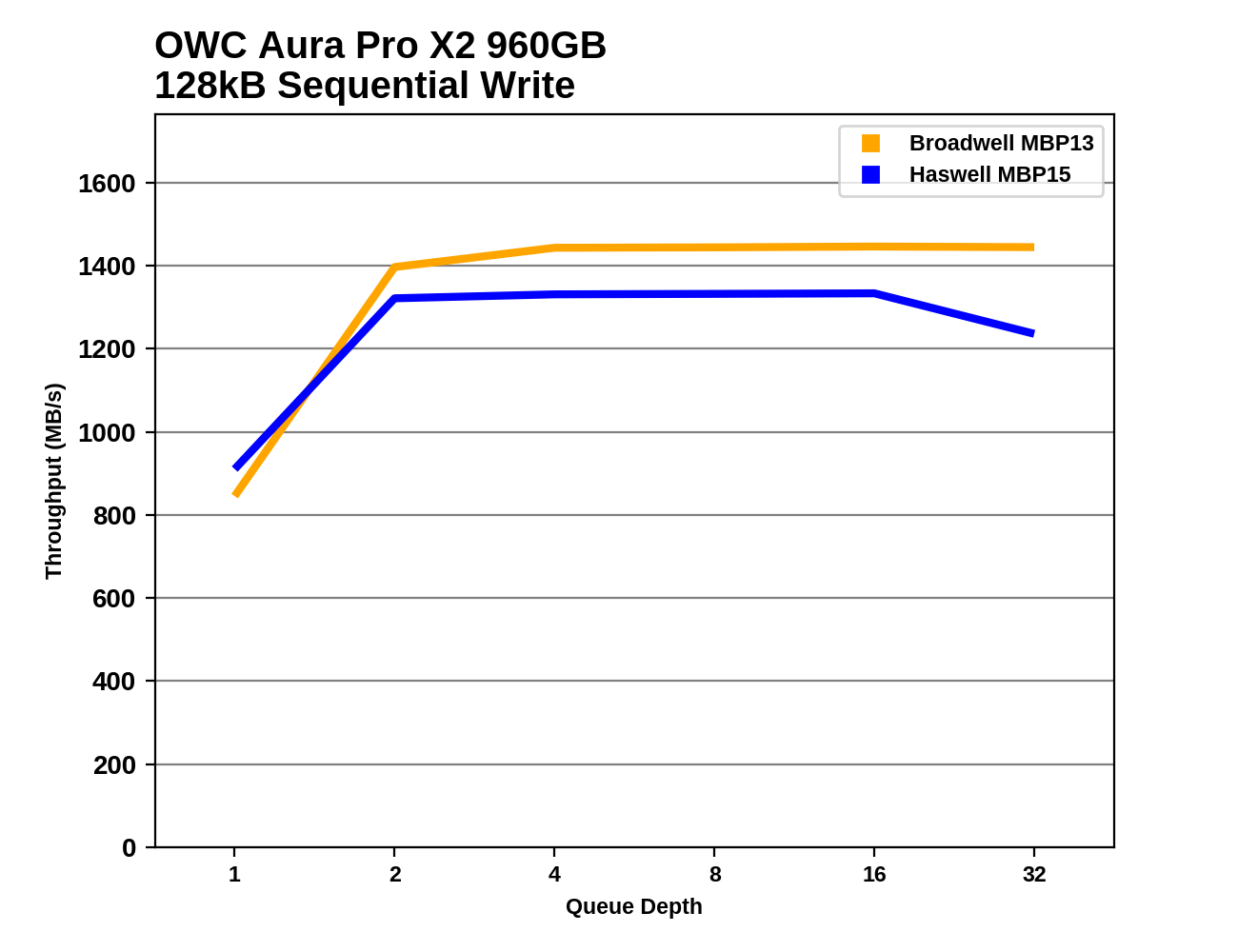 |
|||||||||
Most of the drives hit full speed at QD2 and provide steady performance for the rest of the test. The HP EX950 is the least consistent, especially on the older Haswell MacBook Pro.
Mixed Sequential Performance
Our test of mixed sequential reads and writes differs from the mixed random I/O test by performing 128kB sequential accesses rather than 4kB accesses at random locations, and the sequential test is conducted at queue depth 1. The range of mixes tested is the same, and the timing and limits on data transfers are also the same as above.
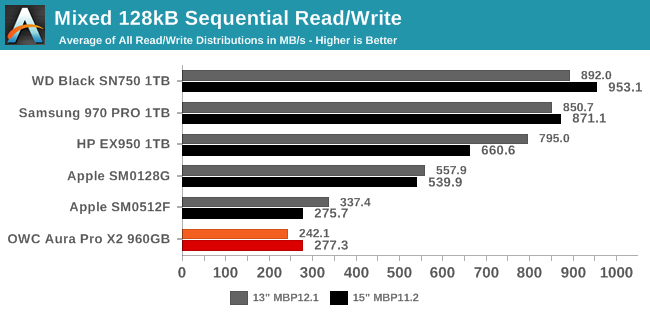
The OWC Aura Pro X2 runs into serious and surprising trouble on the mixed sequential IO test, and it affects the test runs on both of the MacBook Pros used. The overall average performance ends up being slightly worse than the older Apple original SSD, and about a third of what the HP EX950 (slowest of the three modern M.2 drives) scores.
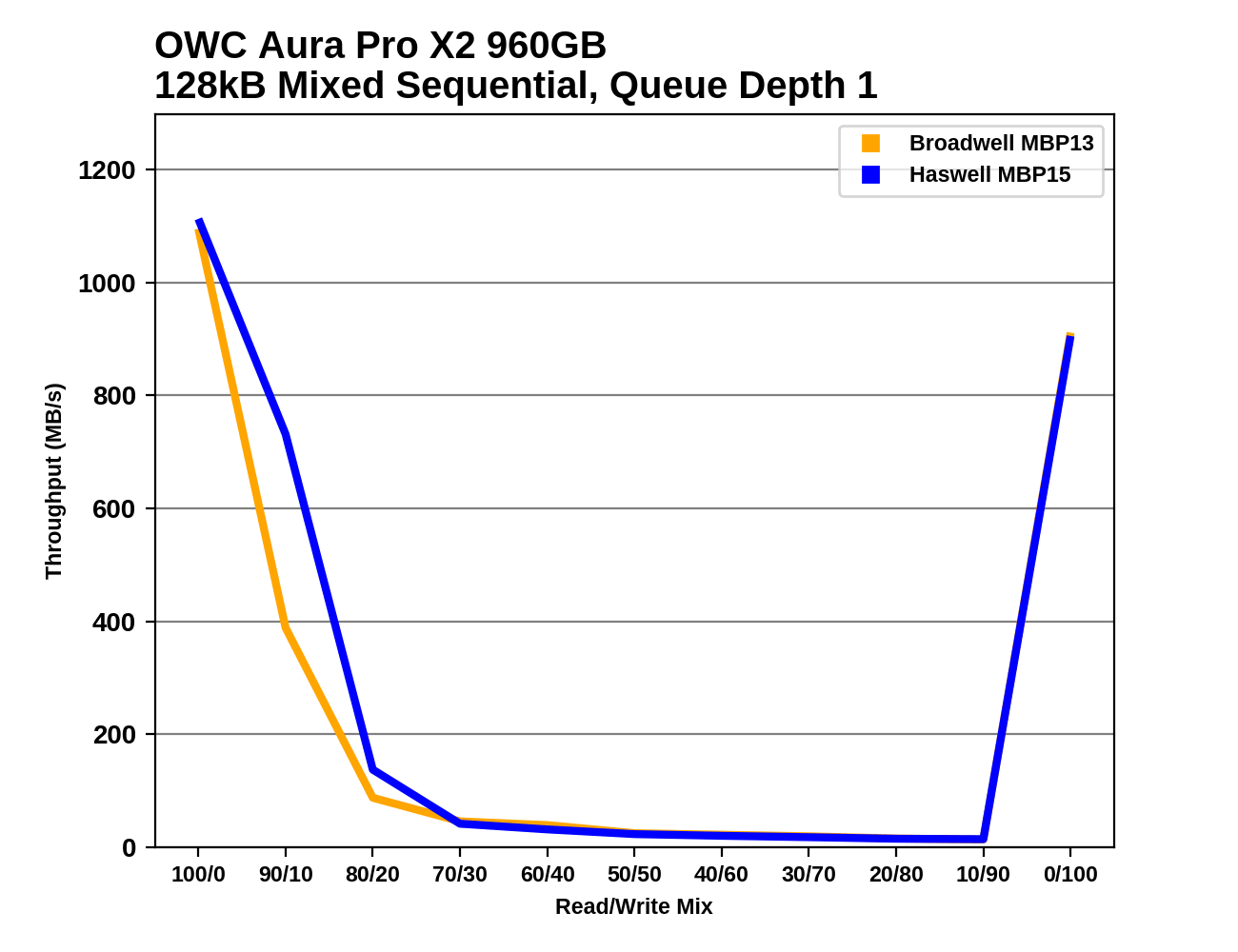 |
|||||||||
Looking closely at what happened to the Aura Pro X2 during the mixed sequential IO test, at either end of the test when the workload is pure reads or writes it is competitive with the other modern NVMe drives, but when reads and writes are interleaved it falls apart. Performance for 90% reads isn't too bad and still beats the Apple original SSDs, but for all the other mixes the Aura Pro X2 is a serious step backward.










32 Comments
View All Comments
Samus - Thursday, June 6, 2019 - link
I installed an Aura N 1TB SSD in a 2014 Macbook Pro just a few days ago for a customer. Went off without a hitch, booted from a Time Machine backup and did a restore without an issue. Now what to do with the old 128GB SSD that's basically useless...MamiyaOtaru - Thursday, June 6, 2019 - link
that's what the case they also sell is for. Turn it into a turbocharged thumb drive.tipoo - Friday, June 7, 2019 - link
I'd still be really curious to see a T2 mac put through these tests. Prior to it at least, Apple SSDs were good at sequential reads and writes but fell lower than the competition on 4K random and mixed loads, I'd be curious how one given such a powerful controller would do.nfriedly - Saturday, June 8, 2019 - link
I tried twice to upgrade my wife's 2014 MacBook SSD. First with an OWC drive, and second with a Samsung 970 and an adapter. The OWC one would often crash the MacBook when waking from sleep. The Samsung one would crash it while she was using it. E.g. launching a program would cause it to freeze and then reboot. I gave up and put her apple SSD back in.Oxford Guy - Friday, June 14, 2019 - link
Was it an OWC made specifically for this purpose? If so, then it should have worked.As for the Samsung, there are drives that have better reputations for Mac compatibility. Look at the link in the comments here and read that carefully.
leexgx - Monday, June 17, 2019 - link
OWC does not support the sleep states correctly they have never corrected thiswitch is stupid as the point of OWC ssds is for mac compatibility and faking official apple SSD to automatically enable trim support out of the box
Rene23 - Wednesday, June 19, 2019 - link
I would not buy such special / proprietary SSDs, and instead just go the dapper dongle route, more choice, more flexibility, ... https://www.youtube.com/watch?v=0QGO9XJY60sSandris - Saturday, June 22, 2019 - link
Just bought and install OWC Auro Pro X2 SSD for my MacBook Air 6.2 as I really trusted OWC, but find out that there are issues with sleep mode and this issue could not be solved. As per OWC technical support, the solution is to ship back OWC Aura Pro X2 SSD to OWC and cover all costs, if I do not like loose Sleep functionality of my MacBook. No disclaimers on OWC web on technical incompatibility with MacBook Air 6.2.ttot - Saturday, August 10, 2019 - link
Really wishing for a Transcend Jetdrive 850 comparison as this seems to be the only (adapter-less) competitor. Additionally, what about plate-less adapters? Are those too bulky too?jimmarz - Friday, March 27, 2020 - link
There are a lot of problems with the Aura Pro X2. I bought a computer from OWC with their drive installed. I have had nothing but problems with it and keep getting EFI Check dumps. OWC refused to acknowledge there was even a hardware issue. Even after I shipped it back to them! I wasted tens of hours troubleshooting, formatting and re-installing the OS etc. at OWC urging. Finally I sent the machine to Apple and sure enough they flagged the SSD as the problem. Spend your money on something else. There are literally hundreds of complaints on Yelp about OWC and these drives.